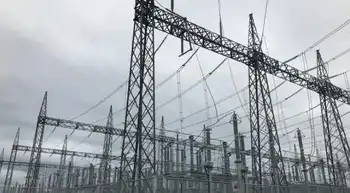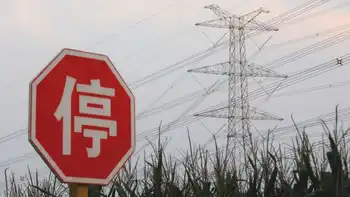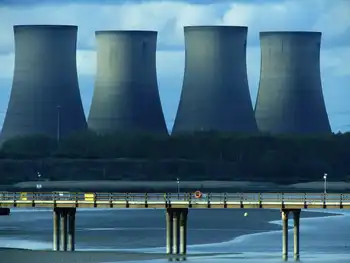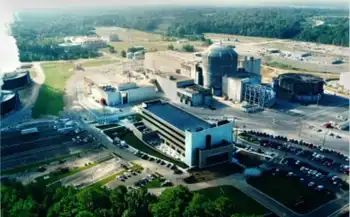Energy infrastructure preferences of New Englanders
Wind farms are preferred by an overwhelming majority and construction of LNG terminals shows substantial support. A narrow majority support transmission line construction as well as nuclear plant license renewal. However, support for constructing new nuclear plants and clean coal generating facilities remains mixed.
New England relies on nuclear energy plants to generate 27% of the region's electricity — the second largest source of supply. Supporters of nuclear energy point to the fact that this generating technology emits no greenhouse gases, has an excellent safety record, and 18 plants with evolutionary designs offering significant safety enhancements have recently applied for construction licenses outside of New England. Opponents say there is still no workable solution for disposing of nuclear waste, that the plants are very expensive to build, and that an accident cannot be ruled out.
Forty-eight percent (48%) of New Englanders surveyed said they at least somewhat favor the construction of new nuclear plants in the region. Men were found to favor new nuclear plant construction more so than women — 59% versus 38%. Republican respondents were more supportive — 61% compared to 50% of Independents and 39% of Democrats. New Hampshire survey respondents were found to be the most supportive, where 60% of those surveyed were at least somewhat in favor of new nuclear plant construction.
The 40-year license term of nuclear plants was originally established to reflect the amortization period that was traditionally used by electric utility companies for large capital investment — and not on a facility's anticipated operating life, which is longer.
The NRC formally reviews all license renewal applications in a stringent process that can last up to three years. To date, the NRC has approved license renewal for dozens of plants including Millstone Units 2 and 3 in Connecticut. License renewal applications of both Pilgrim in Massachusetts and Vermont Yankee are undergoing review as the operating licenses for those plants will expire in 2012.
License renewal supporters point to the fact that nuclear plants are operating better than ever, must meet rigorous regulatory inspection requirements to gain renewal, and they don't contribute to global warming. Opponents argue that nuclear technology is out-dated and older plants are too dangerous to continue operating.
Fifty-five percent (55%) of New Englanders are at least somewhat in favor of renewing the licenses of existing nuclear plants in the region — with 28% strongly in support. Again, men were found to be more in favor — with 65% compared to 47% of women. Survey respondents in New Hampshire were the most supportive — with 62% in favor. (Seabrook's operating license does not expire until 2026.)
For decades, Liquefied Natural Gas (LNG) has been vital in maintaining a balance between the region's natural gas supply and demand. LNG is delivered by tanker from the Caribbean country of Trinidad and Tobago through Boston Harbor to the Distrigas terminal in Everett. Offshore deepwater LNG ports in New England include the recently completed Northeast Gateway facility located off Cape Ann, Massachusetts and the Neptune LNG port, being built approximately 10 miles off the coast of Gloucester, Massachusetts.
Supporters of LNG terminals point to the fact that LNG currently supplies 30% of the region's natural gas on a cold winter day, has a proven track record of safety all over the world, and that we need to expand supplies of natural gas. Opponents point to safety concerns like vulnerability to a terrorist threat.
Sixty-five percent (65%) of New Englanders surveyed are in favor of building new LNG facilities in the region — with 35% strongly in favor. Survey respondents in Rhode Island seemed to be the most supportive — with almost 70% at least somewhat in favor.
Technology advancements along with federal and state subsidies have enabled wind-generating facilities to produce electricity that is now cost competitive with other sources of generation. Wind facilities have no fuel costs, but they do have maintenance and capital development costs that must be recovered over periods of intermittent operation (as electricity generation can be highly variable depending on wind speeds).
Wind generation currently comprises less than 1% of New England's electricity supply. Because the best locations for wind generation tend to be in scenic mountain and ocean-side areas, the siting of turbines has often proven to be controversial. About two-thirds of New Englanders remain concerned that the Cape Wind project has been blocked by a "not in my backyard" attitude.
Supporters of large wind farms say that they don't emit greenhouse gases, the wind is free and unlimited, and new advances in technology make this a more viable source of electricity supply. Opponents point to the fact that wind farms are aesthetically unappealing, they are expensive — even with taxpayer subsidies — and that they only operate about 30% to 40% of the time.
Eighty-four percent (84%) of survey respondents said they are in favor of constructing large wind farms. Overall favorability remained the same as last year — but the "strongly favor" portion increased by 10 percentage points to 61%. In terms of favorability, there seems to be no difference between the desirability of small land-based versus large off-shore wind farms. The public simply seems to strongly like wind energy in general.
Coal plants currently generate about 11% of New England's electricity. Hundreds of millions of dollars have been invested in the region in emission control equipment, to significantly reduce the by-products of coal combustion including sulfur dioxide, nitrogen oxides and particulate emissions. Coal burning, however, does produce significant carbon dioxide emissions, a leading global warming gas.
Clean coal is chemically washed of impurities or gasified, burned and then treated with steam to remove sulfur dioxide and re-burned so as to make the carbon dioxide in the flue gas recoverable. The Brayton Point Station located in Somerset, Massachusetts is hosting a pilot-scale clean coal gasification plant — to demonstrate the conversion of coal into natural gas. The process prevents the release of carbon dioxide and captures other by-products.
Clean coal supporters point to the fact that clean coal plants reduce greenhouse gas emissions by about 50% from existing technology, it is a low-cost domestic source of fuel, and the plants are easy to build and operate. Opponents say clean coal plants still produce considerable amounts of greenhouse gases, and that mining coal damages the environment.
Fortynine (49%) of survey respondents said they favor building clean coal plants in New England — with 26% strongly in favor. Republicans seem more inclined to support clean coal facilities — with 71% at least somewhat in favor of them, compared to only 40% of Democrats and 49% of Independents. Survey respondents in Rhode Island were the most supportive — with 61% at least somewhat in favor.
The region's transmission system serves two vital roles: to ensure reliable delivery of electricity from power plants to where it is needed, and to facilitate the trading and delivery of the commodity in the region's wholesale market. Without a reliable and efficient transmission system to move electricity as a tradable commodity, the ability to meet electricity demand reliably and economically is diminished. Over the past few years, significant progress has been made to expand and upgrade the region's transmission system. But more is needed.
Supporters say congestion on existing transmission lines costs consumers hundreds of millions of dollars each year and jeopardizes reliability, and that new lines would solve this. In addition, new lines could bring in electricity generated by renewable hydroelectric and wind facilities in Canada as well as from wind farms located in the Midwest.
Opponents say transmission lines are aesthetically unappealing; require rights of way through many communities, pose health risks, and their expensive construction could be avoided if we simply reduce our use of electricity.
Sixty percent (60%) of respondents said they at least somewhat favor the construction of new transmission lines in the region, with support strongest in Maine and Rhode Island — both at 67%.
Related News
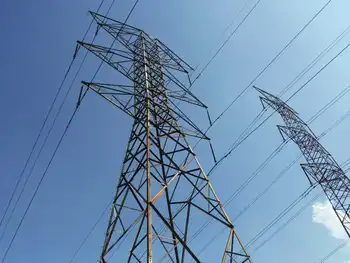
EU draft shows plan for more fixed-price electricity contracts
BRUSSELS - The European Union wants to expand the use of contracts that pay power plants a fixed price for electricity, a draft proposal showed, to shield European consumers from big price swings.
The European Commission pledged last year to reform the EU's electricity market rules, after record-high gas prices, caused by cuts to Russian flows, sent power prices soaring.
A draft of the EU executive's proposal, seen by Reuters on Tuesday and due to be published on Mar. 16, steered clear of the deep redesign of the electricity market that some member states have called for, suggesting instead limited changes to…


